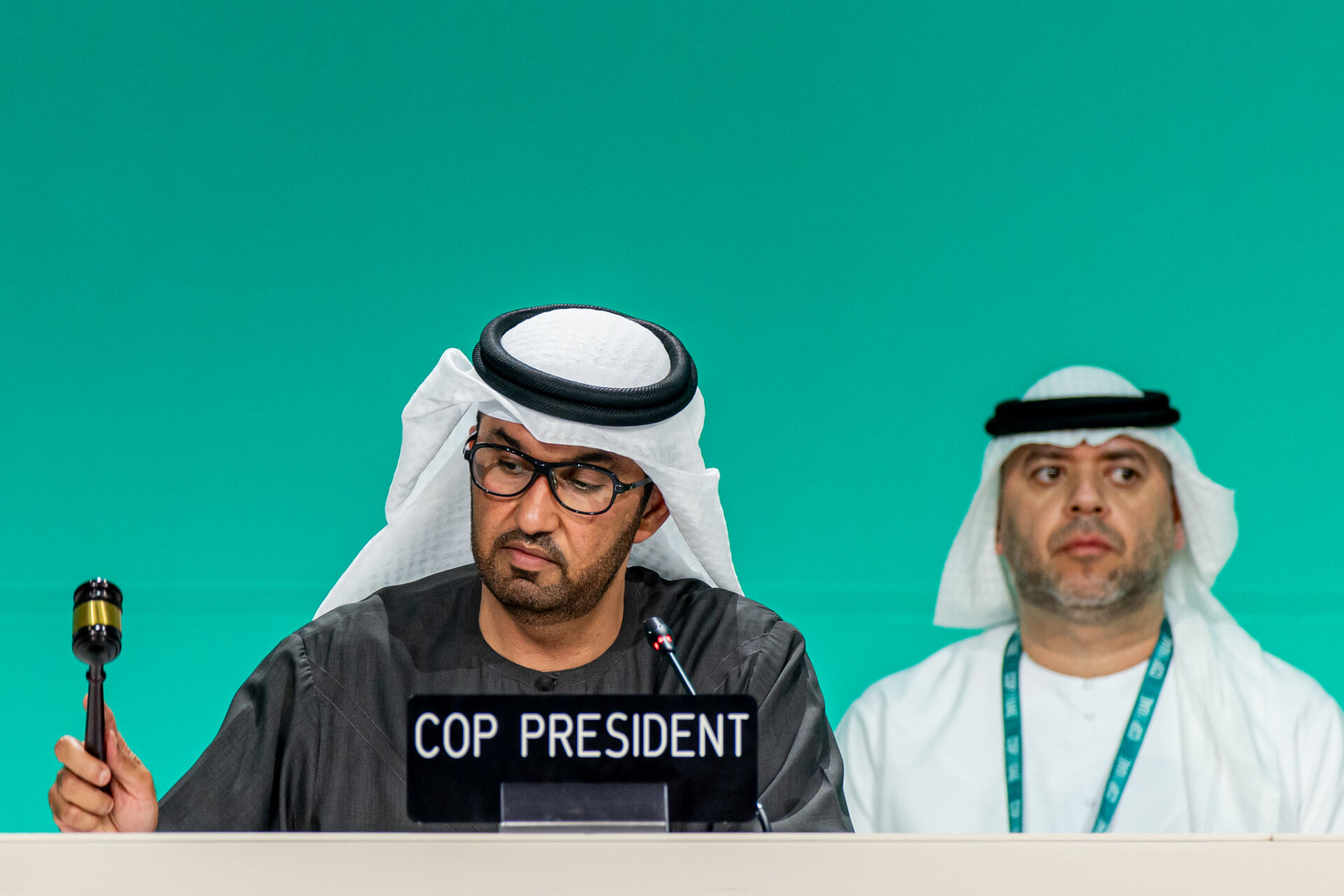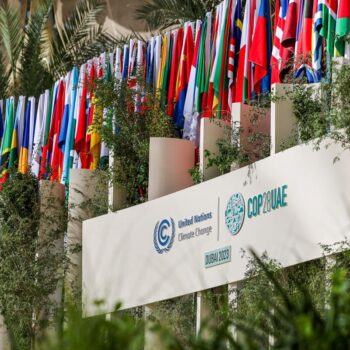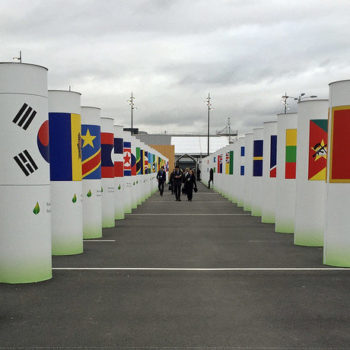- COP28 has concluded with countries agreeing to address the gaps in the common path for global climate action: transition away from fossil fuels, deliver on global targets on adaptation, and take new steps to scale up finance for climate action, critically setting up a new loss and damage fund.
- There are shortcomings – especially on finance for adaptation – and loopholes, but the ultimate direction of travel is clear. The fossil fuel era is ending.
- The final plenary saw strong reactions from Parties to what was a tough negotiation. A standing ovation for Samoa’s call-out of insufficiencies in the final compromises – and in the process that led to them – demonstrated the strength of the high ambition coalition. Brazil, host of next year’s G20 and 2025’s UN climate COP called on the troika of presidencies to deliver on the action the science requires. The US and China revealed they plan to update their respective long term strategies as an immediate action to deliver on the COP28 outcome.
Quotes
Alex Scott, E3G Programme Lead, commenting on the overall COP outcome: “The champions of rapid, ambitious climate action far outweighed the PR might of OPEC at COP28. The UN climate change process is just one place for countries and businesses to craft the pathway for the rapid transition the world needs alone. It hasn’t answered all the questions, but COP28 has signalled an unequivocal beginning of the end of the fossil fuel era.
The proof will be in the delivery – in countries’ next climate plans and the called for transformation of the wider finance system to deliver the economic shifts needed. These are the central tasks from now on the road to Belem at COP30 in Brazil in 2025. ”
Tom Evans, E3G Policy Advisor, said:
“Champions for a rapid phase out of fossil fuels – both small island states and major economies – have pushed the rest of the world to realise this transition cannot be stopped. But this is only a small first step. It is clear that not everyone is ready to admit the truth of what’s needed to avert climate disaster. The COP text shows the hard work that lies ahead: rewiring the financial system, driving action to vastly scale up renewables and energy efficiency, and crucially paying much more attention to adaptation which has been neglected, putting all of us at risk.”
On energy/mitigation, Anusha Mata, E3G Senior Policy Advisor, said:
“This COP signals the beginning of the end of the fossil fuel era, backed by science and boosted by agreements on tripling renewables and doubling energy efficiency by 2030. Its a clear call for governments, business and investors to commit to a cleaner future – all eyes are now on Parties to turn this into faster, real world action. Glasgow language on coal phase-down is locked in, but we still need a swift response to global calls for no new coal now. Finance to support a faster transition must match the scale of the economic transformation. Finally, regulation is required to ensure murky concepts like “abatement technologies” deliver real climate progress. The text does not fully live up to ardent calls for higher ambition, especially from climate vulnerable countries and communities who stand to lose so much. It is the responsibility of Parties to go faster and further from here.”
On finance, Laura Sabogal Reyes, E3G Senior Policy Advisor, said:
“Finance was the constant drumbeat behind this COP, from the establishment of the Loss & Damage fund to the Global Stocktake’s final calls for scaled-up MDB finance, debt and tax reform. Although we are far from bridging the financial gap that will enable the transition to a climate safe world, the inclusion of these provisions was unimaginable just a few years ago. The GST paves the way for broader resource mobilization beyond the UNFCCC into next year’s World Bank’s Spring Meetings and the upcoming G20 Brazilian Presidency, as well as to ongoing initiatives like the UN Tax Convention and the recently-launched Global Expert Review on Debt, Nature and Climate championed by Colombia, Kenya and France.
The missing element, however, was a clear financial package for countries embarking on their energy transition as well as clarity about how to fill the adaptation finance gap. To keep 1.5C within reach, leaving no one behind, developed countries must deliver the necessary essential concessional and grant-based resources to enable these pivotal transitions in developing countries.”
Alden Meyer, E3G Senior Associate said:
“Since the Rio Earth Summit in 1992 where the UNFCCC was launched, Saudi Arabia and its allies from other fossil fuel producing countries and companies have built and defended a massive dam of resistance to any formal UNFCCC decision to phase out fossil fuels. The decision at COP26 in Glasgow to phase down emissions from coal represented the first crack in that dam of resistance; today’s global stocktake decision expanding that call to action to include oil and gas emissions in the energy sector creates another massive breach in the dam.
But the resistance continues, as demonstrated by the multitude of loopholes in the decision, and much work lies ahead to convert the global goal of tripling renewable energy capacity by 2030 as well as doubling the rate of energy efficiency improvements into concrete action in the real world. Action to mobilize the trillions of dollars needed to decarbonize the global economy while protecting people from climate impacts and addressing mounting loss and damage is also essential.
But let there be no mistake – the end of the fossil fuel era is inevitable and was brought a little closer today. The dam of resistance is not gone, but it is clearly crumbling.”
On adaptation, Ana Mulio Alvarez , E3G Researcher, said:
“Initially sidelined, adaptation ended up playing a key part of the outcome at COP28. This sends a strong signal that parties must step up efforts to adapt to a changing climate. While parties did not achieve as a strong Global Goal on Adaptation framework as vulnerable countries wanted, there is now a pathway forward to improve adaptation actions, marking the beginning of a formal coordinated global effort for adaptation and resilience. Parties must engage in this pathway with the highest ambition and solidarity. ”
On energy efficiency, Larissa Gross, E3G Programme Lead, said:
“The UAE Consensus calls the world to action, in alignment with 1.5°C, to double down on energy efficiency and triple renewable energy. This commitment is a strong signal to business, finance, policymakers, and all government leaders that the future is efficient and renewable, setting a clear direction of travel and scale of ambition in this critical decade.
Now comes the hard part – implementation. On collective delivery of doubling efficiency, in 2024, Kenya will take a leading role in driving action and fostering government exchange as host of the annual IEA Energy Efficiency Conference, and France will champion critical action at the Buildings and Climate Forum. These ministerials, as well as initiatives such as the Cooling Pledge, provide the platform for enhanced collaboration but it will be in capitals where delivery is most needed.”
Available for comment
Alex Scott (EN), E3G Programme Lead, (climate diplomacy, climate finance, adaptation finance, loss and damage)
m: +44 7482 750760 | alex.scott@e3g.org
Lisa Fischer (EN, DE), E3G Programme Lead, (gas, energy diplomacy & geopolitics, renewables, fossil fuels)
m: +44 (0)7710 167 754 | lisa.fischer@e3g.org
Tom Evans (EN), E3G Policy Advisor, (climate ambition, the Global Stocktake, UNFCCC processes and COP28, climate diplomacy & geopolitics)
m: +44 (0) 7931 317 327 | tom.evans@e3g.org
Nick Mabey OBE (EN), co-CEO and co-founder, (climate diplomacy, foreign policy, macroeconomics)
m: +44 (0)7949 768 771 | nick.mabey@e3g.org
Alden Meyer (EN), Senior Associate, (UNFCCC and G7/G20 dynamics, multilateral climate and clean energy diplomacy, mitigation ambition, climate finance, US policy and politics)
m: +1-202-378-8619 | alden.meyer@e3g.org
Ana Mulio Alvarez (EN, ES), E3G Researcher, (UNFCCC, loss and damage, adaptation)
m: +32 490 000 514 / +34 639 916 760 | ana.mulio@e3g.org
Byford Tsang (EN, CN), E3G Senior Policy Advisor, (China, including domestic and international climate pledges, EU-China relations)
m: +44 (0) 7508 759 872 | byford.tsang@e3g.org
Anusha Mata (EN), E3G Senior Policy Advisor, (fossil fuel transition, coal phase-out)
m: +44 (0)7817 560 411 | anusha.mata@e3g.org
Laura Sabogal Reyes (EN, ES, DE), E3G Senior Policy Advisor, (Public banks – multilateral development banks, bilateral development banks – Paris Alignment, climate finance, nature finance, innovative financial mechanisms, E3G Public Bank Climate Tracker Matrix website)
m: +49 160 96466368 | laura.sabogal@e3g.org
Larissa Gross (EN), E3G Programme Lead, (sustainable cooling, clean heat, energy efficiency)
m: +44 (0) 7712 537 874 | larissa.gross@e3g.org
Notes to Editors
- E3G is an independent climate change think tank with a global outlook. We work on the frontier of the climate landscape, tackling the barriers and advancing the solutions to a safe climate. Our goal is to translate climate politics, economics and policies into action. About – E3G
- For further enquiries email press@e3g.org or phone +44 (0)7783 787 863.
- We will be continuing our WhatsApp briefing service to highlight key events in climate diplomacy across 2024 and the road to COP29. For instructions on how to sign up to receive occasional updates and analysis from E3G, please see here: E3G WhatsApp registration for journalists – E3G.


